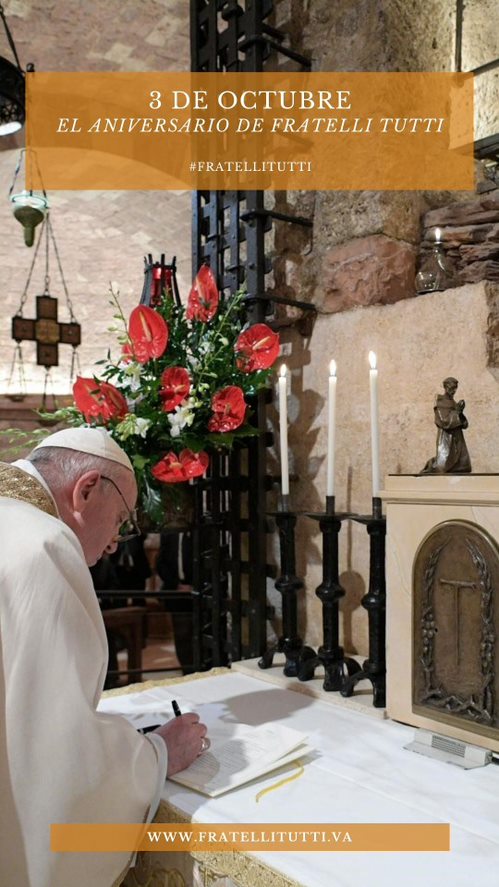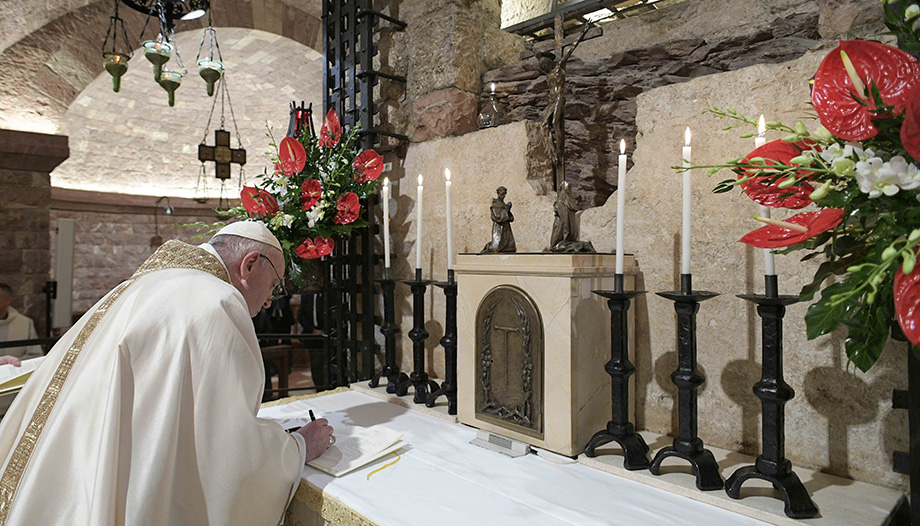 "Fratelli Tutti": Friendship and fraternity, dialogue and encounter.
"Fratelli Tutti": Friendship and fraternity, dialogue and encounter. Background on the fraternity: Inspiration of "Fratelli Tutti".
Background on the fraternity: Inspiration of "Fratelli Tutti".When a year ago we saw Pope Francis sign an encyclical at the foot of the tomb of St. Francis of Assisi, many of us thought that, with such a blessing, such a document would have to be heard by the world. At first glance, however, it does not appear that the world has changed much.
It was the second time that Pope Francis used Franciscan terminology to show, from the weaknesses of our world, that the reading of the saint of Assisi could help us to overcome the individualism and selfishness that seems to move our world, especially in politics and the economy, and that makes the men and women of the street suffer, who wake up every morning with the desire to build their lives and find themselves limited.
The Franciscan novelty is to recover the idea that always haunted St. Francis of Assisi: that either we were brothers to one another, or we could hardly build a world of peace. And for this we needed to know that we were children of the same God and a direct and honest relationship with one another. And when we speak of the other, we must think of the different, the last of society, the discarded of the world and the one who has a different culture from us, but that from the welcome and respect we can dialogue, looking for meeting points, without falling into modern relativism.
Life is conquered every day

One of the important things that the encyclical reminds us of and that ordinary people know is that life is won every day. It is not something that is won once and for all. Human relationships, like the great events of history, are not conquered and that's it, they are either taken care of every day or we end up going back to our old bad habits. And our society has forgotten that we must live on fraternity in order to promote the achievement of our own desires and selfishness.
We have built a society where terms such as 'opening up to the world', which we have sometimes interpreted as listening and welcoming, now mean not being afraid to launch ourselves into a market world different from our environment, breaking our world of comfort to conquer new places and expand our market, and thus achieve quotas of power, even if it is in the loneliness of the one who reaches the top.
In addition, we find that politics, which should be the engine of relationships and the builder of the life of society, is manipulated and managed by economic interests, in such a way that politics only serves to disqualify one another, without being a builder of relationships, and what is worse, building a culture of selfishness that breaks the cultural traditions that have been able to build a society in relationship.
In the midst of this world without a culture of rootedness, populisms are born that enclose us more in ourselves in front of those who are different, and regardless of the shore they are from, these new organizations do not think of the other but of themselves. In such a way that those who must leave their land are not only not welcomed in other countries, but are used as weapons to promote a throwaway culture, trying to socially eliminate those who do not think like us.
The figure of the Good Samaritan
From our faith, the figure of the Good Samaritan is essential, not only to see how we should act in our relationship with God and with others, but above all because it leads us to the need to build an anthropology that has at its center the person and his relationships with others and with creation.
When this anthropology leads to acceptance, then we are able to integrate so many exiles, who do not necessarily come from other countries, but who have settled in our city fleeing rural poverty, into the social and religious community that they are able to create culture and not feel uprooted, with all the negative consequences that this entails for everyone.
The encyclical 'Fratelli tutti' makes us realize that, while it is true that we must build our world on the basis of freedom and equality, we cannot forget that freedom is not based on the individualism of doing what everyone wants, and we are not all the same, but that diversity is richness.
For this reason, Pope Francis invites us to seek in dialogue and encounter the best tool for overcoming selfishness. Dialogue does not mean accepting everything that is proposed to us as valid, but seeking points of encounter between societies and people. This dialogue is neither the one carried out by politicians throwing the opponent's faults in their faces, nor the one that takes place in social networks. Dialogue is face to face with the person, recognizing him or her as such and in the interest of achieving a common good.
Family and forgiveness
Everything starts from the simplicity of the family, which suffers joys and tastelessness, but which also knows how to forgive and reconcile and that joy that we learn to live in the family we must be able to bring to society. Forgiveness does not imply forgetting what has happened, the one who forgets runs the risk of committing the same mistakes again, therefore, we must not forget, to build from the ashes a world of reconciliation and peace.
As we pointed out at the beginning, Pope Francis reminds us that the economy is not bad in itself, how many entrepreneurs in this time of crisis from a Christian mentality of commitment and sharing have taken care of their workers so that their companies and the lives of the families of each one of them go forward. However, there is an economy that we must denounce, it is the globalizing economy that annuls people, that manipulates governments and does not take into account the most disadvantaged, destroying the common place of each one to build selfish ends.
It has been a year since the signing of the encyclical and there is still much to be built before we can speak of the existence of a true universal fraternity. But we cannot forget that steps must be taken, that hope is a fundamental element in the life of a Christian and that in the face of adversity we cannot allow ourselves to be carried away by the rhythms set by a sick society that needs human relationships to heal and build a world where we are all brothers and sisters.
Franciscan priest. Theological Institute of Murcia OFM. Center for Theological Studies of the Franciscan Order in Spain.











